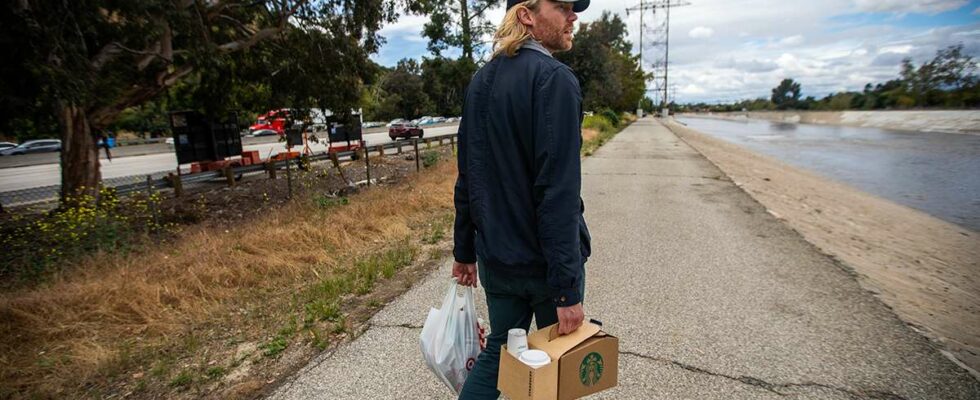Hayes Davenport, a former comedy writer, transitioned from entertainment to public service, working at Los Angeles City Hall to address homelessness. He began his journey by supporting Nithya Raman’s city council campaign in 2019, later becoming a senior advisor. After three and a half years, he left to focus on TV and advocacy, launching the Substack « Big City Heat » and a podcast on Measure A, which seeks funding for homeless services in L.A. County. He emphasizes the power of local engagement to support unhoused individuals.
—
Hayes Davenport, un ancien scénariste comique, a effectué une transition du divertissement au service public en travaillant à la mairie de Los Angeles pour lutter contre l’itinérance. Il a commencé son parcours en soutenant la campagne de Nithya Raman au conseil municipal en 2019, devenant plus tard conseiller senior. Après trois ans et demi, il est parti pour se concentrer sur la télévision et l’engagement civique, lançant le Substack « Big City Heat » et un podcast sur la Mesure A, qui vise à financer les services pour les sans-abri dans le comté de L.A. Il insiste sur le pouvoir de l’engagement local pour soutenir les personnes sans abri.
Hayes Davenport is an accomplished comedy writer, recognized for his work on popular shows such as “Eastbound & Down,” “Family Guy,” “Vice Principals,” and “Dickinson.” However, he stepped away from this career for three years to serve at City Hall, concentrating on the challenges faced by Los Angeles’ homeless community.
Davenport’s journey began with his support of Nithya Raman’s campaign, leading to her election as a Los Angeles City Council member for the 4th District in 2020.
“It was Nithya who paved the way for me to engage with people, something I never felt I could do alone,” he reflects. “Once I started helping people off the streets, it became something I couldn’t ignore. It ignites a sense of empowerment that few jobs can match.”
His initial interaction with Raman occurred in 2017 during his volunteer work with SELAH Neighborhood Homeless Coalition, a nonprofit aimed at homeless outreach. When she announced her candidacy for the council seat in 2019, Davenport decided to leave his position co-showrunning the comedy series “Chad” alongside Nasim Pedrad to focus solely on the campaign.
“When Nithya decided to run, I recognized the vital role city council plays in L.A., especially concerning homelessness. It was an opportunity I couldn’t let slip away,” he mentioned. “I couldn’t just sit by and watch her take action without being part of it. I initially planned to return to TV after the election, but seeing friends who campaigned alongside me make real changes in City Hall changed my perspective.”
In July 2021, Davenport joined Raman’s team as a senior advisor. While he could no longer facilitate writers’ meetings, he found relief in hosting popular comedy podcasts, “Hollywood Handbook” and “The Flagrant Ones,” which balanced out the demanding work at City Hall.
Recently, Davenport announced on X that he resigned from his government position after three and a half years; however, his advocacy work will continue unabated.
“I decided to leave now because I recently welcomed my second child, and I am also delving into more TV projects,” he shared. “Additionally, I think it’s a great time to re-engage in discussions about city issues, something that’s harder to do while being a city employee.”
Notably, Davenport previously co-hosted the “LA Podcast” focused on local politics and policy from 2018 to 2021, and he is eager to revive those discussions. He recently launched a new Substack titled Big City Heat alongside his career shift announcement and kicked off a new podcast miniseries shortly after. His immediate focus? Measure A.
Measure A seeks voter approval to enhance funding for homeless services for over 75,000 individuals without a home in L.A. County. The proposal aims to increase the current 1/4 cent sales tax to a 1/2 cent tax. Davenport emphasizes the crucial nature of this measure, which builds on the earlier passed Measure H.
“Every day I’m reminded of how drastically our approach to homelessness has evolved over the past seven years,” he notes. “In the past, when someone sought shelter, our only option was a large group shelter in Bell, California, located 12-15 miles from our outreach area. Many individuals were unfamiliar with it.”
“There were no city-operated shelters at that time,” he continues. “Everything was managed by nonprofits. Now we can offer people hotel rooms within the same communities where they’ve lived for years, along with services aimed at helping them transition to permanent housing. The progress we’ve made in L.A. since 2016-2017 is astonishing, and it’s largely due to the new infrastructure established through Measure H, initiated in 2017. To eliminate these services would revert us to a time of minimal assistance—merely distributing water and leaving individuals to fend for themselves.”
In addition to discussing Measure A, Davenport underscores the stark differences between presidential candidates and their potential impact on L.A.’s homelessness services.
“We are dependent on the federal government for housing vouchers and emergency funding for pandemic-related programs,” he explains. “Federal emergency funds allowed us to provide hotel stays for homeless individuals, fundamentally changing our shelter network. Without this funding, we would expect to face significant challenges. If Trump were to return to office, the likelihood of receiving such funds is slim, and the repercussions could be dire.”
Beyond participating in elections and advocating for awareness, Davenport stresses an important first step for those looking to support L.A.’s homeless community.
“An email to your local representative can be a surprisingly powerful tool in local government
